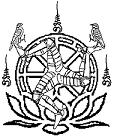Purpose/Effects
The Reflection on Gratitude practice is simply being remembering and being thankful for the positive things in our lives. Through focusing on positive Experiences and allowing these to fully be recognised, we can see life in a more healthy way. Reminding us to find satisfaction in what we have, and be content with what we have, rather than being greedy and treat things in a disposable way.
METHOD:
Summary
Acknowledge things which you are grateful for everyday, and at the time.
Long Version
History
Gratitude practice is part of many of the world's major faiths. The Psalms of the Bible are the centre of Jewish and Christian worship on thanks. The prophet Muhammad, founder of Islam, said, "Gratitude for the abundance you have received is the best insurance that the abundance will continue." The Hindu ritual of puja expresses gratitude to its deities through offerings.And the contemporary positive psychology movement recommends gratitude practice as one of the strongest tools for promoting a sense of general wellbeing in all.
Within Buddhism Anumodana means thanksgiving, and can be commonly seen as a blessing for generosity by giving thanks for dana, or as a consent to the donation.
Notes
The Reflection on Gratitude practice is simply being remembering and being thankful for the positive things in our lives. Through focusing on positive Experiences and allowing these to fully be recognised, we can see life in a more healthy way. Reminding us to find satisfaction in what we have, and be content with what we have, rather than being greedy and treat things in a disposable way.
METHOD:
Summary
Acknowledge things which you are grateful for everyday, and at the time.
Long Version
- Keep a dedicated journal for your gratitude practice. Every day, write a list of at least three things you are grateful for, or find joy in, no matter how small and unimportant it may seem i.e. someone loaning you a pen, or a gift of some sort.
- When you recognise an opportunity for gratitude, spend a few moments noticing, and allowing the experience and significance to sink in.
- You may find there are certain "core items" of thanks. Things you want to pay special attention too. these should go on their own dedicated page/s. Other things you are thankful for may repeat but not more than two or three days in a row.
- If you do not want to make a list, at the end of every day, simply spend some time reflecting on the day and what you are thankful for.
- See the giver behind the gift. When something nice happens, it did not happen all by itself, think about the person and people who made this opportunity for thanks happen. Express your genuine gratitude to those even if it is only a mental note of respect for their unknowing part and say thank-you to everyone.
- Note reasons as to why you are grateful for each thing at the end of the day i.e. having food - I have a easy access to food from the store, nature... unlike those who live in famine conditions, or are not able to get food for another reason. And note who was involved in bringing this occasion to life. You may wish to note special events of each week, which are not "core items, on their own page with date markers.
- Keep to this practice at least five out of seven days for three weeks.
History
Gratitude practice is part of many of the world's major faiths. The Psalms of the Bible are the centre of Jewish and Christian worship on thanks. The prophet Muhammad, founder of Islam, said, "Gratitude for the abundance you have received is the best insurance that the abundance will continue." The Hindu ritual of puja expresses gratitude to its deities through offerings.And the contemporary positive psychology movement recommends gratitude practice as one of the strongest tools for promoting a sense of general wellbeing in all.
Within Buddhism Anumodana means thanksgiving, and can be commonly seen as a blessing for generosity by giving thanks for dana, or as a consent to the donation.
Notes
- When things you can be thankful for seam scarce - due to anger, disappointment, or other negative mind state - you can read previous entries, or practice Metta Meditation.
- The sooner you are able to recognise opportunities to be thankful, the greater the effect of internalizing the experience will have.

 RSS Feed
RSS Feed
